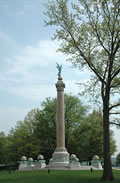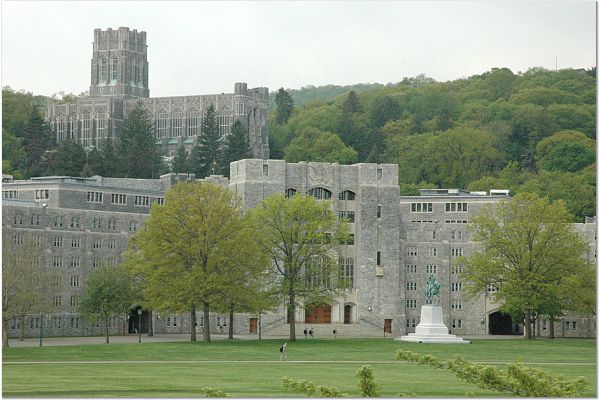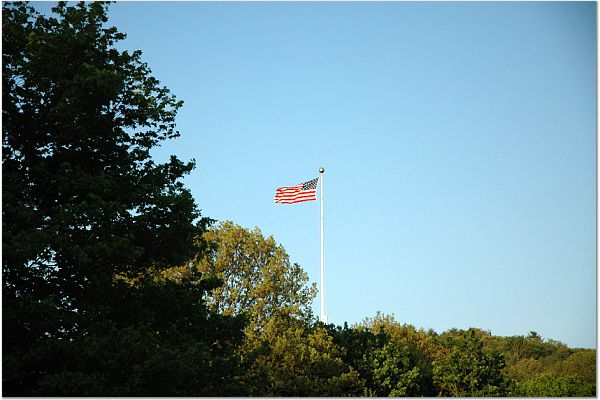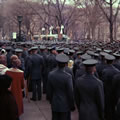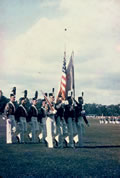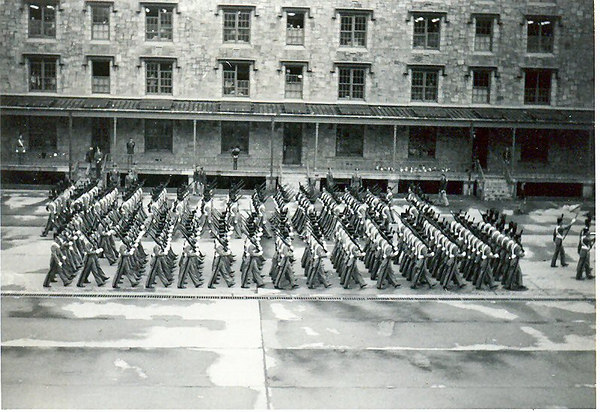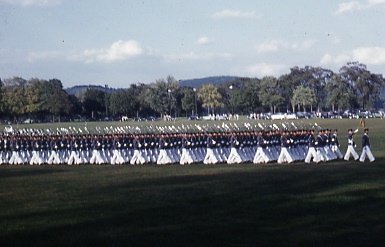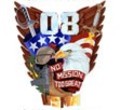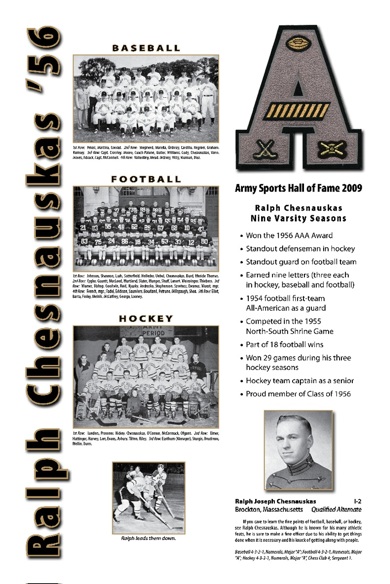Lacrosse
Sports Illustrated -- June 12, 1961
JOYS OF A JUNE WEEK --
By Ray Cave
Army and Navy, those classic rivals, celebrate graduation time with fun and games at West Point and Annapolis, and both win approval from several thousand pretty guests
Whether you were the type who loves a parade, the sort who goes where the girls are or simply a connoisseur of athletic Donnybrooks -- the place to be last Saturday (June 3d) was either West Point or Annapolis.
On the stern high bluffs above the Hudson were the pomp and pageantry of an Army graduation week, hundreds of pretty young ladies who had come from every state in the union and an Army-Navy baseball game that starred a very famous athlete. And on the gentle slopes of the Severn, the Navy offered more gold braid and brass bands, more beauties and a lacrosse game with a national championship at stake.
When Navy held its pep rally on Thursday evening, two days before the game, it had no inkling that the Army lacrosse team was nursing a year-long grudge. The likelihood of athletic successes was adding to the normal joys of the Annapolis June Week. An electric "Beat Army!" sign flashed from Bancroft Hall, the world's biggest dormitory, which houses all 3,665 of the midshipmen.
Rear Admiral John F. Davidson, the academy superintendent, was introduced at the rally by a glib midshipman as "Big Daddy," and he took it gamely while the exuberant middies cheered. Already the first dates were arriving for their week-long stay, a social assembly that would include three dances, three parades, a concert by Duke Ellington and an address by President Kennedy at graduation. Tough old Navy captains with houses on the academy grounds were helplessly watching their wives take in girl boarders by the score, while the graceful but small colonial town of Annapolis (23,385) was preparing its boarding houses for 50,000 visitors. (Also ready: the town's 200 legal Slot machines, the biggest concentration of one-armed bandits east of Las Vegas.)
The town's narrow streets, meanwhile, looked like a scene from a Monte Carlo road rally. Four hundred graduating first classmen had bought cars. On May 27 regulations preventing them from using automobiles had been lifted, and convertible sport models in flaming red were obviously this year's choice.
"I know we'll do well," summed up the admiral as he spoke at the Thursday pep rally. "Army, Army, call the doctor," sang the midshipmen while they waved their bright white hats and stood impressively tall in the short-sleeved, tropical uniforms that Navy wears in such hot spots as Guam, Panama and Annapolis.
The next morning the Navy lacrosse team was practicing on an athletic field so close to the Severn River (which is actually a tidal backwater, not a river at all) that when Coach Bill Bilderback arrived his first words were, "Don't throw the balls in the water."
The Navy squad should be able to throw well enough to miss a river. Last year it was unbeaten in college play, ending the season by defeating a favored Army team at West Point. (That was the game which Army was remembering so well this week.) This season Navy won nine more consecutive college games, but frequently in such hairbreadth fashion that John Paul Jones would have given up the ship as lost. Navy was badly behind against every major opponent. It trailed Maryland 5-1 in the second half and fought back to win in overtime. It was behind 8-4 to Baltimore University in the last period, and scored in the last minute to beat Virginia.
Speed and stamina, not lacrosse finesse, seemed to be winning for Navy. At the beginning of the season the Middies were actually given little chance of another title. "But we kept improving every game," said Coach Bilderback, sounding a little surprised himself. Navy was getting excellent play from a big (6 feet 2 inches) attack man, Tom Mitchell, had an outstanding defenseman in Team Captain Neil Reich and six football players who provided some brute force. The most noticeable of these was John Hewitt, captain of next year's football team. Navy's 1961 lacrosse philosophy was simple: run, run, run, and eventually the other fellow won't be able to get up and down the 110-yard field. This worked all year.
But if Navy was a surprise, Army was more so. In the state of Maryland there is a tendency to feel that a man cannot play lacrosse unless he is raised within 40 miles of Baltimore. Army was pooh-poohed for playing a weak schedule, and accused of using more muscle than talent. "Animals," a Baltimore newspaper said of the Army team, after carefully making an exception of the Marylanders on it.
One little non-Marylander, however, was a 5-foot 8-inch, 154-pound twirling nuisance named Pat Hillier, who was from Long Island. His 20 goals led Army's scorers. "Best we've seen," said the Navy scouting report bluntly, after listing six things he did well. Another was 155-pound Rusty Broshous, from the town of West Point, N.Y.
In the midfield Army had Ron Hannon, a 1961 version of Pete Dawkins. Hannon was first captain of cadets, star of the basketball team and, as Navy put it, "a rough, tough midfielder." The Army defense was composed of three football players, none of whom had handled a lacrosse stick before their second year at West Point. "Our stick work isn't the best, but we hit people," said one of them, Glenn Adams, a big, fast football halfback with a knack for understatement.
Army Coach Jim Adams -- tall as a Texan, laconic as a down-Easter and actually (of course) from Baltimore -- felt that his team, like Navy, also had developed late in the season. And it had two other striking similarities to Navy: a tough defense and the run, run, run philosophy. "We'll just try and keep up with them," Coach Adams said. He made it sound wistful. Bilderback was also sounding wistful. Looking at the national lacrosse trophy which Navy has kept since last year's victory, he said, "I hope I won't be wrapping it up soon."
Despite occasional showers, more than 6,000 paid their way into the Navy stadium on Saturday. CBS-TV was also there, taping the game for a sports spectacular to be shown five days later. What they got was a spectacular game. The Navy defense gave Army only 10 shots in the first half (20 is average). But Army, body-checking, battering and, most of all, running, as it substituted four different sets of midfielders, kept its poise. Poor Navy shooting resulted in a 2-2 tie at half time. Then, in the space of 51 frantic seconds shortly after the start of the third period, Navy poured in three goals. Against any less resolute opponent this would have ended the game. At the same time the crowd was cheering the news (announced on loudspeakers) that Navy had won in Army-Navy track, tennis, golf and baseball.

But Army coolly tightened its defense, began putting two men to chasing the Navy player with the ball, and got away with it when "untirable" Navy started slowing down. Army scored while a Navy player was off the field with a penalty, scored again when a midfielder broke through all alone at the goal, and finally tied the game at 5-5 when a beautiful bounce shot by Hannon skidded in.
The blitz continued when a daring pass the full length of the field set up a goal by Broshous. A minute later Broshous brazenly stole the ball from the Navy goalie and flipped it in for a score. In the last moments of the third period Army Captain Sam Wilder almost casually held the ball behind the Navy goal, then came out to his left and scored with exactly one second left. This, the last of six straight Army goals, was doubly discouraging to Navy and proved decisive, because the Middies fought back to 9-8 before finally losing 10-8. So determined was Army's defense that not a single Navy goal was made by a first-string attack man. Army's Broshous and Hillier each scored twice.
At the final gun the air was filled with sticks, gloves and helmets thrown high by the Army players. The Army substitutes, who had stood up the entire game as if to show the team's determination, joined the melee. Happy Jim Adams was carried to the dressing room and congratulated by an Army general wearing a "Beat Navy!" button just below six impressive rows of service decorations on his uniform.
"Your boys wanted it real bad," said Navy's beaten Bilderback to Adams. "Lots of guts." And it must be said that Navy gave nothing away; Army simply took it.
The victory left it up to the Intercollegiate Lacrosse Association to either name Army national champion, or make both Army and Navy co-champions because each lost one game, Army to Virginia. But whatever they do, Army has what every Army team wants most, the win over Navy. Minutes later the Army team was roaring and shouting as its bus crawled through the traffic back to the Navy field house. There it grabbed Jim Adams, starched shirt and all, and threw him over a sea wall into the Severn. As his players were about to let him fly, a frantic Navy voice of authority was heard shouting, "Don't! Don't! The tide's out!" But Navy was just a little too slow again. There was, it turned out, enough water to float Jim Adams, the happiest man at June Week.
James Adams - Army Lacrosse Coach 1958 - 1969
Hall of Fame - - - http://www.uslacrosse.org/museum/halloffame/view_profile.php?prof_id=10
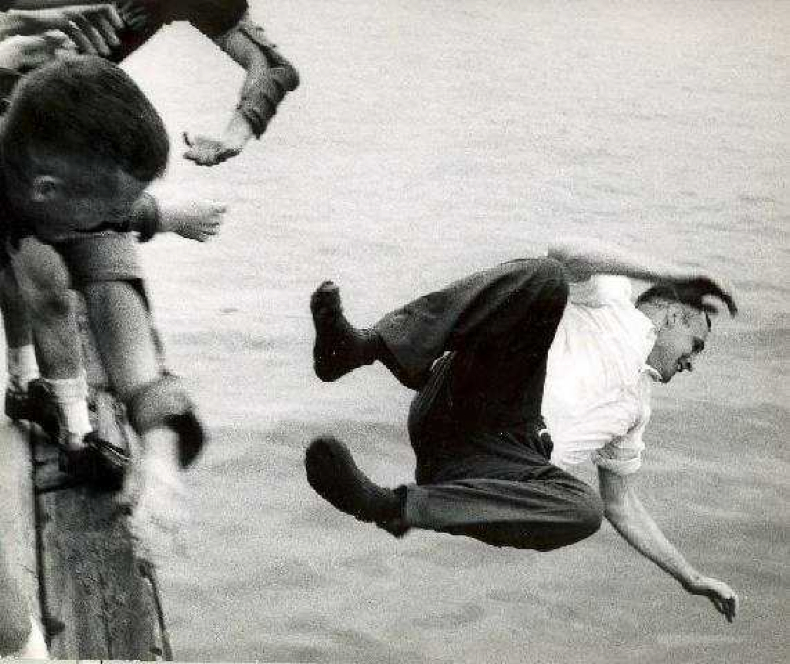
Coach Ace Adams being chunked into the Severn River after the 1961 Army-Navy Lacrosse game, won by Army 10-8.photo provided by Butch Darrell - 1962 Lacrosse Captain
Sports Illustrated -- June 09, 1969
INTO COMBAT WITH STICKS, FOR MORE THAN A TITLE -- Patrick F. Putnam
Every Army-Navy match is a miniwar, but the Cadet lacrossemen had never forgotten the ultimate humiliation they were forced to endure following The Great Drubbing of 1965
For Jim Adams, Army's laconic and long-suffering lacrosse coach, it would be his last chance for some time, perhaps forever, to smack the smugness out of Navy. The Middies do not cross sticks with Penn, and that's where Adams, because he has five daughters, will be employed next year. At Penn, the daughters of coaches go to school tuition-free; at West Point, where they are stuffy about the sex of their students, they do not. And so - the last trip to Annapolis, with the national championship, or at least an equal share of it with Johns Hopkins, to the winner, and, well, no quarter to the loser. Army hadn't won this game since 1963, and no one at the Point has been able to forget or forgive The Great 18-7 Drubbing of 1965, when the Middies' first string poured it on for almost the full 60 minutes, then walked away laughing.
"They never put in any of their reserves," Adams grimly told his heavily favored Cadets in the locker room just before last Saturday's game. "They just kept running up the score. And when it was over, they picked up Bill Bilderback [the Navy coach] and carried him over to our bench. It was the most humiliating moment of my life."
In lacrosse, the teams sit on the same side of the field and are separated by no more than the width of the official scorer's table. Carrying a winning coach over to greet the loser is akin to sinking an enemy and then shooting holes in his lifeboats. The Army, led by its scoring ace, Pete Cramblet, voted to ignore all white flags.
"It's nothing personal," said Cramblet. "Take the Navy guys one at a time and you'll like them all. Nice guys. But get them all together and you don't want to know them. We don't just want to beat them, we want to beat them badly."
The Cadets went into Saturday's game with only a 14-11 loss to Johns Hopkins against them. No team had held them to fewer than 10 goals, and in seven of their nine victories they had won by eight goals or more. "The only way to beat Army," the ancients of the game were saying, "is to score 20 and hold them to 19."
"The way we got to try and beat them," said John Padgett, Navy's premier defenseman, "is to knock them down, intimidate them. We've got some good tough boys and there're going to be some people on the ground."
When Bilderback scouted an Army game recently, he took Padgett with him. In Saturday's game the 5'11", 187-pound senior was given the task of stopping Cramblet. When Navy had played Hopkins, Padgett had been sent to do the same job against All-America Joe Cowan, had shut him out and Navy had shocked everyone by winning 9-6. It was Hopkins' only loss this year. The Middies had been less fortunate against Princeton and the Carling Club, losing to both by 10-8 scores. And Princeton lost six games, which made a lot of people wonder how the Navy managed to win 10.
"We won because the kids wanted to win," said Bilderback, an unassuming little man in baggy pants who has won six national titles and shared two others in 11 years as Navy coach. "We don't have any superstars, just a bunch of fighters. Lacrosse is just like combat, and our kids wouldn't be at the Academy if they didn't want to be in combat." Then he grinned. "But I guess that's why they are at West Point, too."
Saturday's combat had hardly begun when Army's John Connors took a pass from Marty Knorr, slipped past a Navy defender and drilled home a goal. And few in the crowd of 16,056, the largest in collegiate lacrosse history, noticed that Army, disdainfully, had not even started Cramblet. Now he trotted in. An All-America as a sophomore last year, he had 35 goals and nine assists going into the Navy game. Rivals would love to double-team him, but they can't because there's sophomore Tom Cafaro, who is almost as good, with 16 goals and 23 assists. And Knorr (17-18). And Darby Boyle (11-17).
"We like to mix them up, use them in different three-man combinations," said Adams happily. "It keeps the other team confused."
Adams shook his head. "That Cramblet is something else. You almost have to not coach him. You hate to tamper with his style, which may not be classic but is natural to him. You tell him what to do and he does it a different way, yet he winds up scoring. It's not that he's a rebel; it's just that he has to play his way to play well." He smiled. "I guess you can say his performance has overcome my coaching frustrations."
Out on the field Cramblet was playing lacrosse his way, left-handed. He took a pass from Charlie Jarvis, a footballer who plays lacrosse defense as though armed with an ax, took two steps to the right - and passed to Boyle, who scored.
"But they said he doesn't pass off," said the bewildered Middies. "No matter. We'll get our share. That Army goalie isn't too much."
The goalie was Rob Stewart, a small fireplug who had moved into the job six games after the season started. The Navy scouting report on him said: "Shoot and ye shall score." And Navy, which shoots often if not very well, unloaded 46 shots at him, most of them wildly. One shot, fired in desperation, sailed high over the goal and passed through the football goalposts 20 feet beyond, which left the crowd demanding three points for a field goal.
On Navy's shots against Stewart, only 17 came near the goal and only three went in. The Middies scored their fourth goal against the reserves, while Army was voting to give Stewart the game ball (final score: Army 14, Navy 4). There is no record of what Navy voted to give its scout.
If Navy's attack was having its problems, Army's, led by Cramblet, who scored four goals and had two assists, was not. The Cadets took 10 fewer shots than Navy, scored with 10 more. "No sense throwing the ball," needled an Army player later, "unless it goes in the net."
Cramblet didn't get his first until early in the second period, and it was a beauty. He came in behind the Navy goal from the left - chased by Padgett - turned away, went into the air and let go over his right shoulder.
"Actually, it was pretty lucky," he said later. "All I was trying to do was avoid getting hit. I saw Padgett coming and I went up to get away from him. I was just trying to get rid of the ball." He scored twice more in the quarter, and Army took an 8-3 lead into halftime.
But Navy wasn't done. For 14 minutes and 59 seconds of the third period the Middies held Army in check, until Knorr found Navy's goal unattended with one second left in the period and scored, to make it 9-3. "Until then, it was tug-of-war," said Adams. "Navy had to do its thing to get back in it, and we had to do ours to hold our lead. Just two forces struggling to see who could get some momentum going. That fast goal at the end just took it out of them."
With six minutes to play, Adams relented: he pulled his starters. But when it was over, the Cadets were relentless ---- they piled Adams on their shoulders and carried him the six feet to the Navy bench. Rat-a-tat-tat. Under went the Navy lifeboats.
|
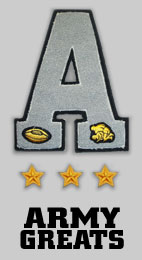
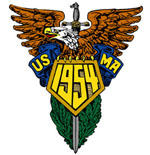
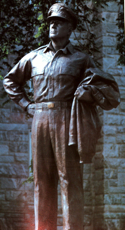 General MacArthur stated it would take
General MacArthur stated it would take 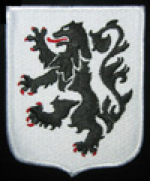 28th Infantry Regiment
28th Infantry Regiment 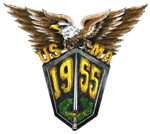
 They played perhaps Army's Greatest Game.
They played perhaps Army's Greatest Game.
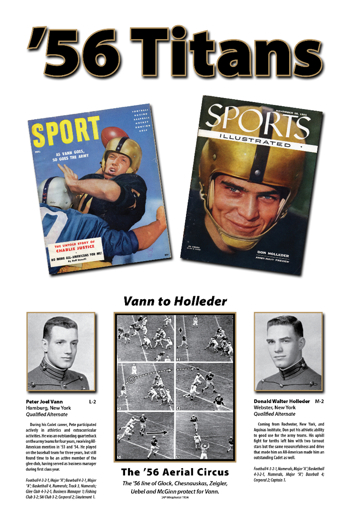
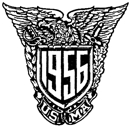
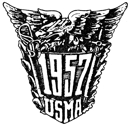
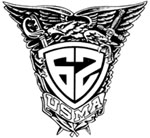
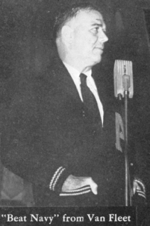

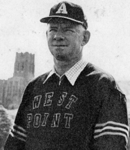
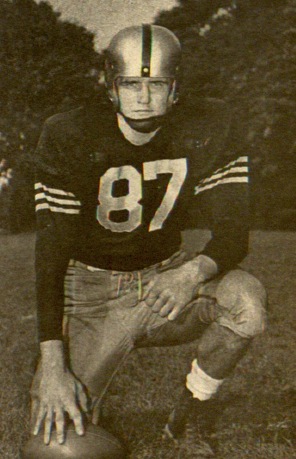

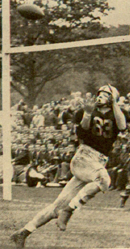
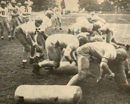
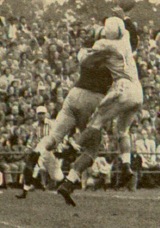
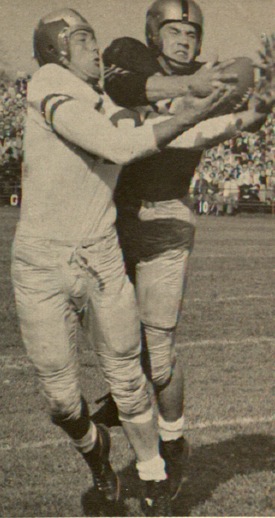
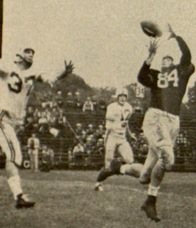
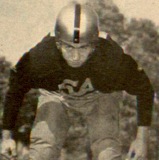
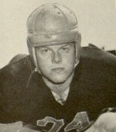
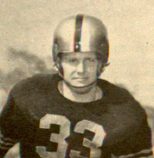
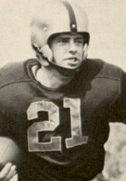
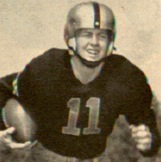
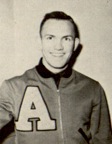
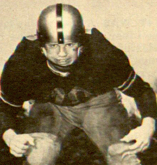
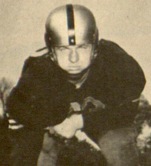
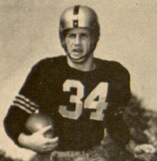
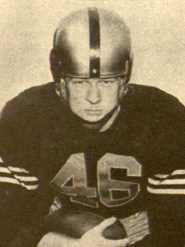
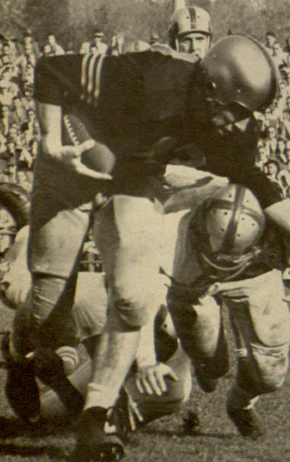
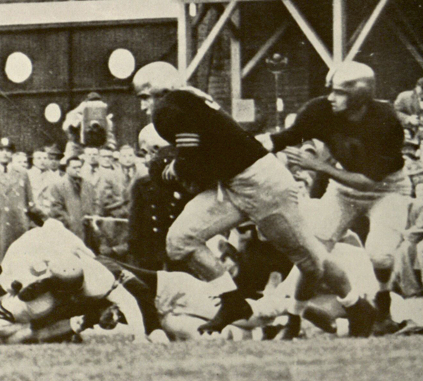
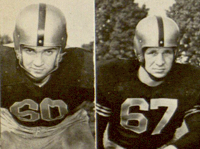
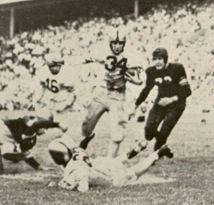
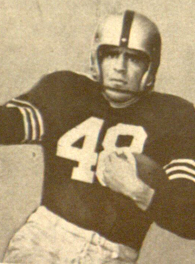
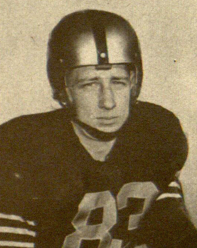

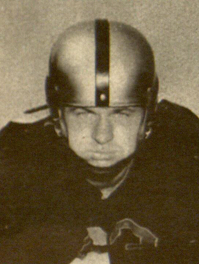
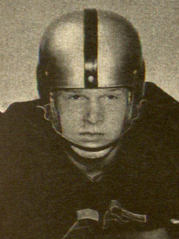
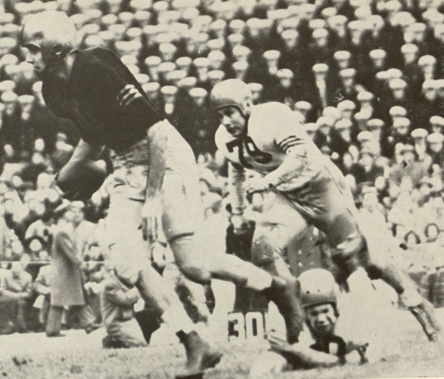
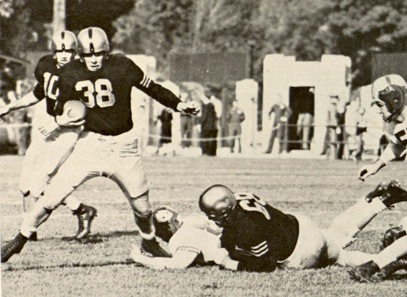
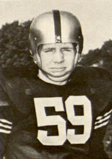
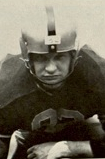
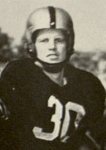
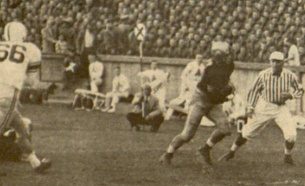
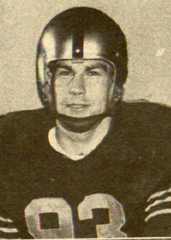
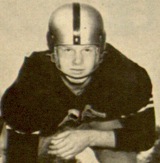


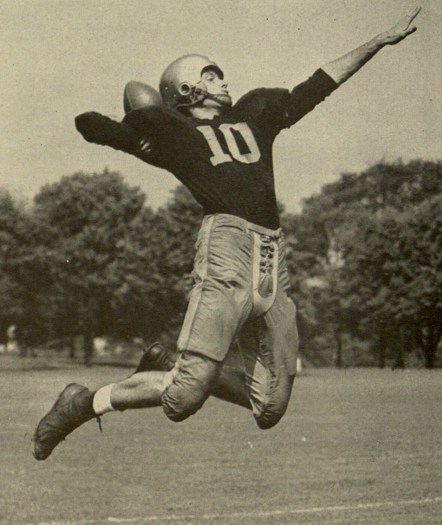
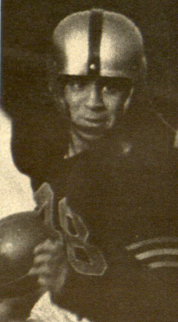
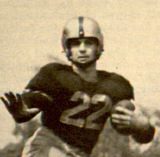
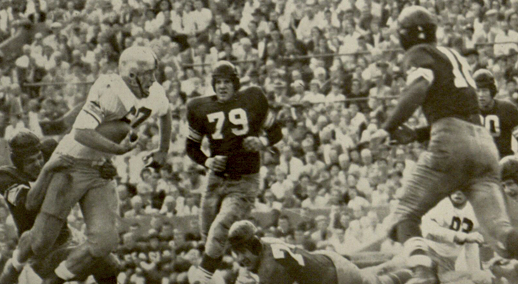

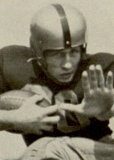
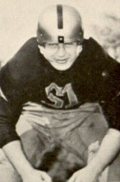
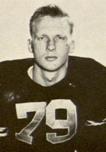
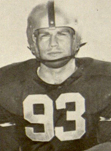
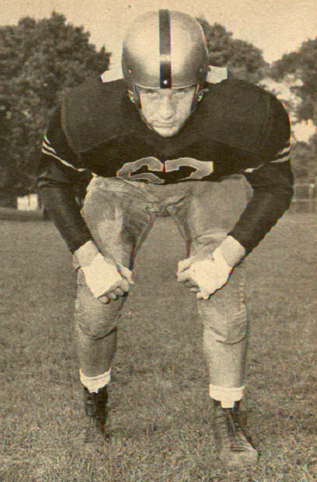
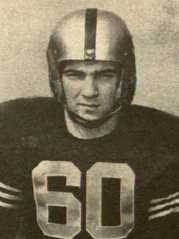
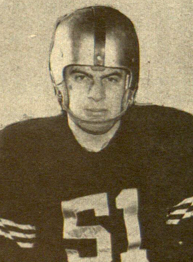
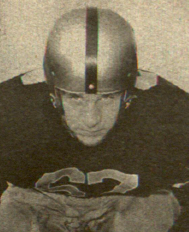


 General MacArthur stated it would take
General MacArthur stated it would take 


 28th Infantry Regiment
28th Infantry Regiment  They played perhaps Army's Greatest Game.
They played perhaps Army's Greatest Game.




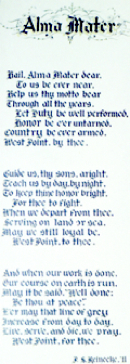
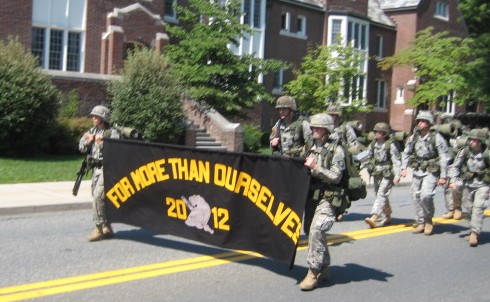
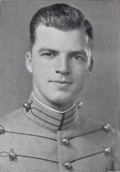


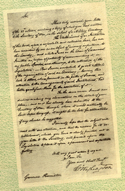
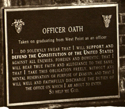


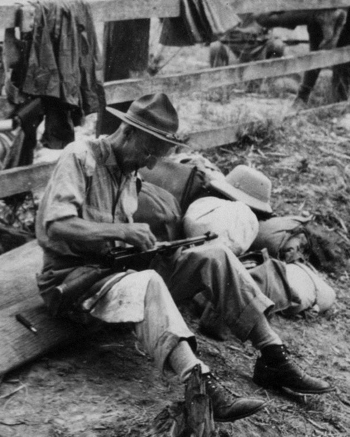
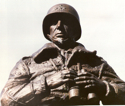

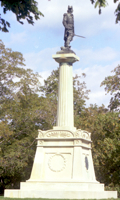
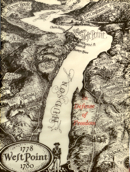
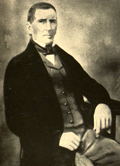

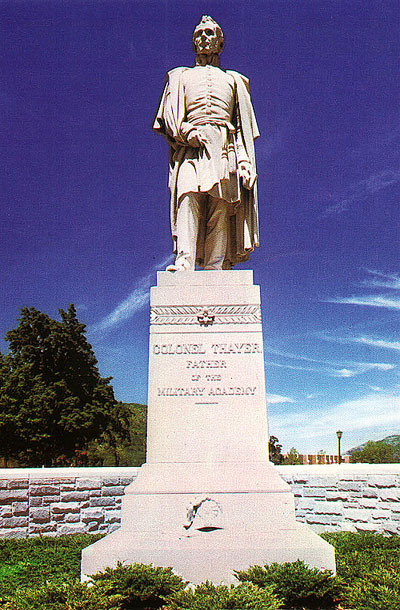


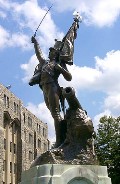




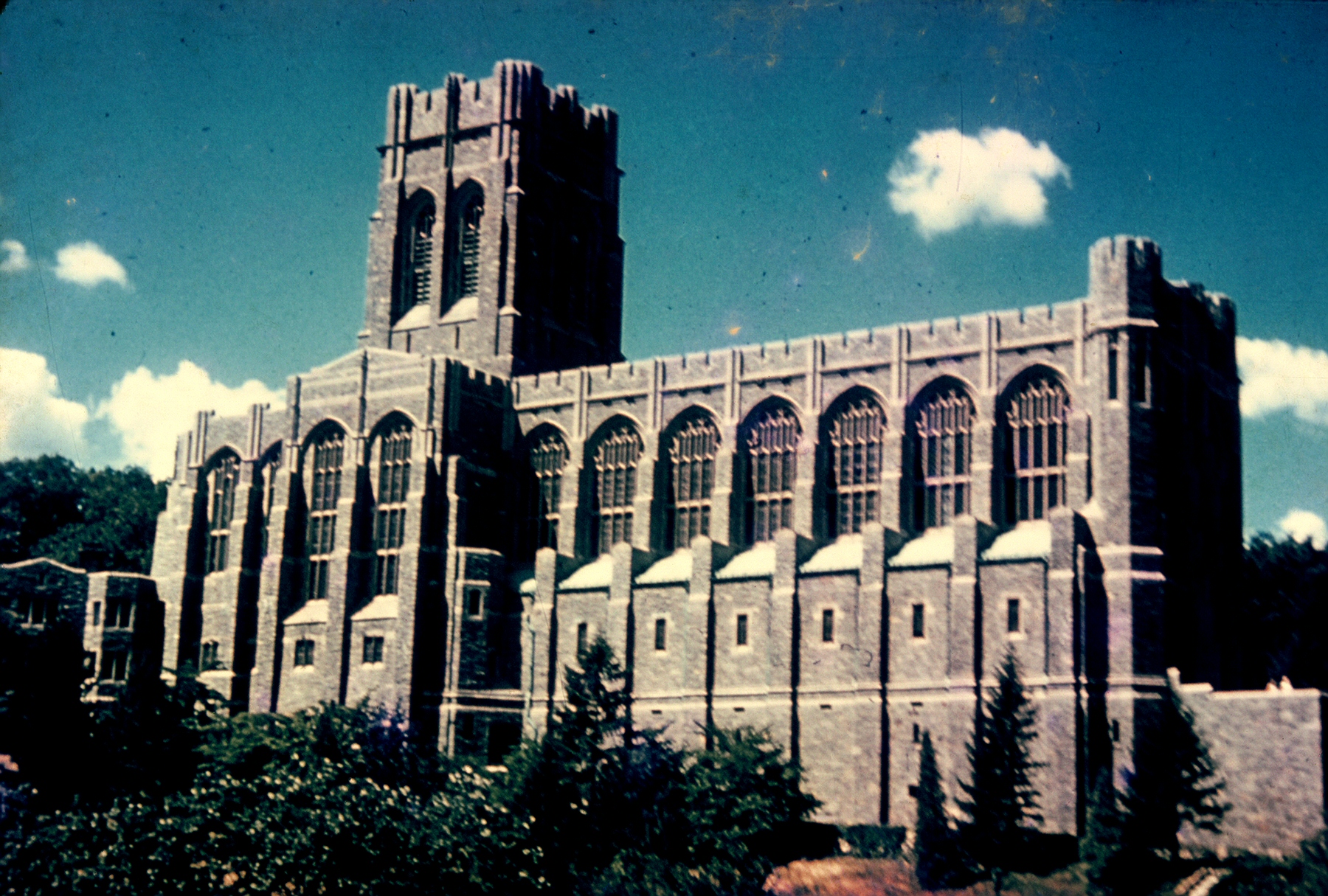






 Cadet Barracks
Cadet Barracks



